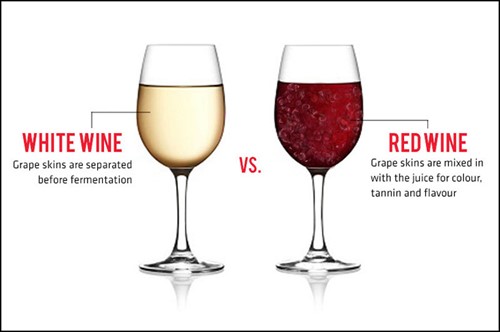Why is white wine healthier than red?

Unveiling the Health Benefits of White Wine Over Red
The Grape Debate: White vs. Red
When it comes to the world of wines, the ongoing debate between white and red has enthusiasts and health-conscious individuals alike pondering over which one is the healthier choice. While red wine has long been associated with certain health benefits, recent studies have brought the spotlight onto white wine, showcasing its unique set of advantages. Let’s uncork the reasons why white wine may just have an edge in the realm of health.
Antioxidant Power: The White Wine Advantage
One of the primary factors that set white wine apart is its rich antioxidant content. While red wine contains antioxidants like resveratrol, white wine is not to be underestimated. White wine is abundant in antioxidants such as flavonoids and polyphenols, which play a crucial role in combating oxidative stress and reducing inflammation within the body. These antioxidants contribute to overall cardiovascular health, offering protection against various chronic diseases.

Low Calorie Content: A Sip Closer to Your Fitness Goals
For those mindful of their calorie intake, white wine emerges as a favorable choice. White wines typically have lower calorie counts compared to their red counterparts. This characteristic makes them a more diet-friendly option, supporting individuals in their fitness goals. With fewer calories per glass, white wine allows enthusiasts to indulge in a delightful beverage without compromising their nutritional plans.
Bone Health Boost: White Wine’s Calcium Connection
Surprisingly, white wine showcases a positive impact on bone health. The presence of certain minerals, including calcium, in white wine can contribute to the fortification of bone density. While red wine does contain some minerals, the calcium content in white wine becomes a distinguishing factor, making it an appealing choice for those aiming to maintain strong and healthy bones.
Reserving Red for Cardiovascular Health
Despite the various advantages associated with white wine, it is essential to acknowledge the specific benefits that red wine brings to the table, particularly in terms of cardiovascular health. Resveratrol, a polyphenol found in red wine, has been extensively studied for its potential to enhance heart health. This compound is renowned for its ability to improve blood vessel function, regulate cholesterol levels, and reduce the risk of heart disease.
Resveratrol’s Cardiovascular Magic
Red wine enthusiasts can celebrate the presence of resveratrol, a natural compound found in grape skin. This powerful antioxidant has been linked to a lower risk of coronary artery disease by promoting healthy blood flow and preventing the formation of blood clots. The moderation of resveratrol consumption through red wine has been associated with improved heart function, making it a heart-healthy choice.
White Wine: A Delicate Elixir for Stress Reduction
While resveratrol takes the spotlight in red wine, white wine’s unique composition offers its own set of advantages. White wine has been recognized for its ability to promote relaxation and reduce stress levels. The moderate consumption of white wine has been linked to a decrease in cortisol levels, the hormone associated with stress. This calming effect can be particularly beneficial for individuals seeking a soothing and enjoyable beverage experience.

Conclusion: Choosing Wisely for Your Health
In the grand debate of white wine versus red, it’s crucial to recognize that both varieties can offer distinct health benefits. The antioxidant-rich nature of white wine, coupled with its lower calorie content and bone-boosting potential, positions it as a favorable choice for many. On the other hand, red wine’s cardiovascular advantages, courtesy of resveratrol, make it a valuable addition to a heart-conscious lifestyle.
Ultimately, the key lies in moderation. Whether you prefer the crispness of a white wine or the robust notes of a red, savoring your chosen beverage in moderation is the secret to reaping the health benefits without adverse effects. As with any aspect of a healthy lifestyle, it’s advisable to consult with healthcare professionals for personalized advice based on individual health conditions.
So, the next time you raise your glass, consider not just the flavor profile but also the potential health perks that come with your choice of white or red wine. Cheers to a balanced and enjoyable approach to wine appreciation and well-being!
